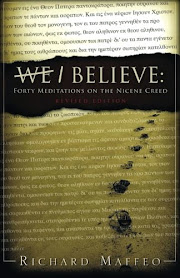There is therefore now no condemnation for those who are in Christ Jesus (Romans 8:1).
Have you ever noticed that God sometimes has to knock us to the ground to get our attention? I have bruises to prove it. But bruises can be a good thing, if we let them be so. The psalmist wrote: It is good for me that I was afflicted, because now I keep thy law. If I had not been afflicted, I would have perished in my iniquity. Before I was afflicted I went astray, but now I keep thy law (paraphrased from Psalm 119:65-75,92).
Or as St. Paul would later write: For the one who sows to the flesh shall reap corruption, heartache, grief, sadness, but the one who sows to the spirit shall reap eternal life, peace, love, hope, joy (see Galatians 5).
Has God knocked you to the ground? I have a suggestion rooted in my experiences: Don't get up until you first get to your knees and apologize to God for what you know to be sin. And if He has not yet knocked you to the ground, please don't wait for it to happen. His love for you makes such discipline inevitable.
And friend, it can be a very long way to fall.
Christians had good reason to fear. Saul rampaged through their towns, dragging men and women before hastily gathered courts. When the disciples refused to abandon their faith in Christ, Saul cast his vote for their execution and watched as mobs hurled rocks at their bloodied and dying bodies. But not satisfied with decimating only the Jerusalem church, he set out toward Damascus to extend his murderous rage against Christians.
Then God knocked him to the ground. And the rest is history.
God used Saul, better known as the apostle Paul, to bring the gospel message to Europe and Asia. He spent the remainder of his life championing the One whom he at first despised. Two thousand years later, Christians still read his letters to find hope, power, encouragement, challenge, and renewal in Christ.
Some think God chose Paul that day on the Damascus road. The apostle, however, saw it differently. He believed God had chosen him long before he mounted his horse for the journey. God's call reached back before he tossed Christians into dungeons, or watched the mob murder Stephen. Before he persecuted the church of Christ "beyond measure and tried to destroy it" (Galatians 1:13), God had already set His seal on him. God chose Paul before he had done anything wrong or right. He chose him before he was born (see Galatians 1:15).
But more important, God chose you before you were born, chose you before you did whatever it is you've done of which you are ashamed and broken . . . chose you still -- today -- to raise you up as a beloved son or daughter.
Oh, imagine that unimaginable privilege!
But more important, God chose you before you were born, chose you before you did whatever it is you've done of which you are ashamed and broken . . . chose you still -- today -- to raise you up as a beloved son or daughter.
Oh, imagine that unimaginable privilege!
Have you ever noticed that God sometimes has to knock us to the ground to get our attention? I have bruises to prove it. But bruises can be a good thing, if we let them be so. The psalmist wrote: It is good for me that I was afflicted, because now I keep thy law. If I had not been afflicted, I would have perished in my iniquity. Before I was afflicted I went astray, but now I keep thy law (paraphrased from Psalm 119:65-75,92).
Or as St. Paul would later write: For the one who sows to the flesh shall reap corruption, heartache, grief, sadness, but the one who sows to the spirit shall reap eternal life, peace, love, hope, joy (see Galatians 5).
Has God knocked you to the ground? I have a suggestion rooted in my experiences: Don't get up until you first get to your knees and apologize to God for what you know to be sin. And if He has not yet knocked you to the ground, please don't wait for it to happen. His love for you makes such discipline inevitable.
And friend, it can be a very long way to fall.

